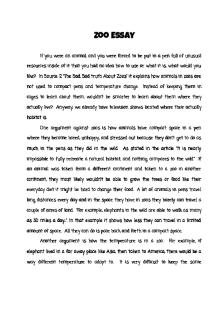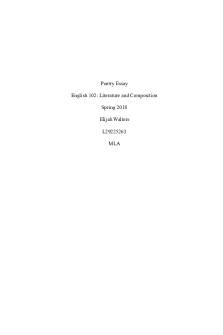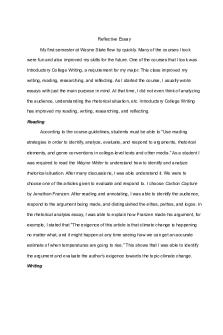Moore\'s Utopia essay - Grade: B+ PDF

| Title | Moore\'s Utopia essay - Grade: B+ |
|---|---|
| Author | Skrrt Skrrt Esketit |
| Course | Introduction to Fiction |
| Institution | Simon Fraser University |
| Pages | 2 |
| File Size | 42.2 KB |
| File Type | |
| Total Downloads | 48 |
| Total Views | 142 |
Summary
Stephen Collis...
Description
In the novel Utopia by Thomas More, he envisions an ideal socialist society where there is always plenty, where the government's rule is fair and pure, and where all men enjoy their work. The surface of this Utopia may seem like a place that everyone would love to live in, however, there are some surprisingly dystopian elements that may make one reconsider. In this essay, I will argue that More’s Utopia is ultimately dystopian because their laws may backfire during economic hardship, they allow for the oppression of women in their patriarchal laws, and they use public punishment and slaves as an inducer of fear to make citizens follow the law. More envisions that his Utopia would always be plentiful in resources. Citizens would be able to take anything “[they] need of, without either paying for it or leaving anything in exchange… since there is such plenty” (88). As labour is “regulate[d] by the necessities of the public” (81), it seems that their society will always be economically well off, in the sense that all citizens will have enough necessities to live comfortably. However, this idealistic vision is an indicator that More’s Utopia is bound to become dystopic in the times of economic hardship. There is no society that can predict nor be immune to the possibility of famine. More’s visions in ways to prevent economic hardship is a clear example of outdated beliefs that seems plausible in theory but disproven in historical practice. The utopia has “no unequal distribution, so that no man is poor, none in necessity” (176). However, in troubling times, every man will be equally poor. When Utopia does not have enough necessity to satisfy everyone’s need, it is in human nature to compete against one another to survive. Some may argue that the realistic possibilities of the Utopia’s values are not the most important, rather, it is the notion that the elimination of inequality would guarantee fairness among citizens and ultimately make More’s society utopian. Hythloday claims that the elimination of money would take away “[m]en’s fears, solicitudes, cares, labours, and watchings” (179). Without money, authoritarian figures would not be incentivized to “take advantage to expound the law for his own profit” (47) because the Utopian laws eliminate the “pride that makes him [favor] glory to excel of others in pomp and excess” (84-85). It is assumed that without materialistic incentives in politics, authoritarian figures would always do what is best for the common good. The claim, however, assumes that pride is a sole product of materialistic wants, yet, one must consider that there are other incentives can encourage prideful pursuits. The social structure of Utopia is patriarchal, in which, power is much greater among men than women. Although there is no materialistic reward for being in places of greater power, men may feel superior in comparison to women, and thus abuse their power. The Utopia laws states “wives serve their husbands” (84) and “[h]usbands have power to correct their wives” (131). These laws justify the right for husbands to condition their wives as if they were slaves. With these laws in place, it is likely for some men to abuse their wives because the role of wives is to serve and therefore, cannot object to their demands. The patriarchal system places all husbands in places of great power. Their laws give room to exercise prideful pursuits through the oppression of their wives, demanding their wives to behave in their favor, while they themselves are not forced to treat their wives in the same respectable ways. Finally, the most dystopian blemish in More’s Utopia is the view of criminal punishment and slavery. Utopians believe that “public punishment is thought necessary for striking terror into others” (132) when great crimes have occurred. It is surprising that a Utopia would use public punishments as fearful reminders for citizens to abide by the rules or fall into the same fate. It is rather dystopian for a
supposedly uncorrupt and just government to use induce fear in their subjects in following the law, a practice that is commonly used today in dictatorships and terrorist groups. Furthermore, Hythloday argues that slavery is a much better punishment than death, he says: [S]lavery is the punishment even of the greatest crimes, for as that is no less terrible to the criminals themselves than death... since, as their labour is a greater benefit to the public than their death could be, so the sight of their misery is a more lasting terror to other men than that which would be given by their death. (132) This view of slavery is troubling for they treat slaves as an exploitable resource. More’s Utopia is built on the backs of slaves, as “[a]ll the uneasy and sordid services [are] performed by their slaves” (87), much of the important hard labour work would not be done without their slaves. It is disturbing that slaves are used as a constant reminder for citizens to behave as their misery is used as a “more lasting terror” (132). In this regard, slaves are clearly treated inhumanely, as they view the slave's punishment as “no less terrible… than death” (132), they are motivated to put slaves in the worst conditions because the slaves are no better than the dead. The use of slaves in More’s Utopia as an inducer of fear is no different than beheading rebels and putting them on stakes as a public display. A Utopia should not need to use fear to force people into obeying the law. All citizens should find the rules that govern them to be fair and not to be feared into following them. Despite the promising ideals made in More’s Utopia, its dystopian blemishes have ultimately made it a society that is far from ideal. The prospect of a society that is always plentiful is impossible to achieve. Since the laws of Utopia is based on the belief that there are always enough resources, all men will become poor when resources become scarce and may have to resort to violent ends. Furthermore, the Utopia is a patriarchal system, so it may be difficult to live comfortably as a woman because men dictate what is right and wrong in a household and have the power to correct their wives. Finally, the public display of punishment indicates that the ruler ship of Utopia more closely resembles a dictatorship than a just kingship. A society cannot be utopian if they must resort to using the slave's misery and public punishment to strike fear to their own citizens. Although More’s Utopia is one that is dystopian in close analysis, it perhaps touches on some of the fundamentals that can be readjusted to create the ideal society....
Similar Free PDFs

Rogerian Essay - Grade: B
- 2 Pages

Zoo Essay - Grade: B+
- 2 Pages

Causation Essay - Grade: B
- 4 Pages

Final Essay - Grade: B+
- 12 Pages

Propaganda Essay - Grade: b
- 4 Pages

Poetry Essay - Grade: B
- 5 Pages

Galileo Essay - Grade: B+
- 6 Pages

Fiction Essay - Grade: B
- 7 Pages

EPQ Essay - Grade: B+
- 10 Pages

Law essay - Grade: B
- 9 Pages

Persuasive Essay - Grade: B
- 3 Pages

Evicted Essay - Grade: B+
- 3 Pages

Charities essay - Grade: B+
- 13 Pages

Reflective Essay - Grade: B
- 4 Pages

Analysis essay - Grade: B+
- 3 Pages
Popular Institutions
- Tinajero National High School - Annex
- Politeknik Caltex Riau
- Yokohama City University
- SGT University
- University of Al-Qadisiyah
- Divine Word College of Vigan
- Techniek College Rotterdam
- Universidade de Santiago
- Universiti Teknologi MARA Cawangan Johor Kampus Pasir Gudang
- Poltekkes Kemenkes Yogyakarta
- Baguio City National High School
- Colegio san marcos
- preparatoria uno
- Centro de Bachillerato Tecnológico Industrial y de Servicios No. 107
- Dalian Maritime University
- Quang Trung Secondary School
- Colegio Tecnológico en Informática
- Corporación Regional de Educación Superior
- Grupo CEDVA
- Dar Al Uloom University
- Centro de Estudios Preuniversitarios de la Universidad Nacional de Ingeniería
- 上智大学
- Aakash International School, Nuna Majara
- San Felipe Neri Catholic School
- Kang Chiao International School - New Taipei City
- Misamis Occidental National High School
- Institución Educativa Escuela Normal Juan Ladrilleros
- Kolehiyo ng Pantukan
- Batanes State College
- Instituto Continental
- Sekolah Menengah Kejuruan Kesehatan Kaltara (Tarakan)
- Colegio de La Inmaculada Concepcion - Cebu
